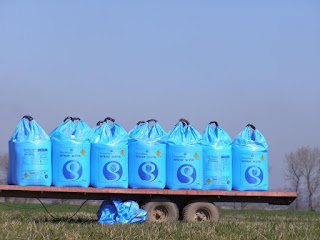
 (image)Spreading organic fertilizer
(image)Spreading organic fertilizer- Talk about U-turns! Picture the incredulity on Peter Melchett's face (Policy Director for the Soil Association) when he heard Hilary Benn's(Defra Secretary of State) proclamation about the need for a strategy to protect the soil for agriculture. "UK land has been steadily degraded by 200 yrs of intensive farming and industrial pollution, warned the Department for the Environment, Food and Rural Affairs(Defra)in a major study of soils".(Guardian,30/09/2009, John Vidal).
It might have taken Peter Melchett a while to recover from the shock of hearing this belated statement from the government (belated by 60 years),because this is the length of time the soil association has been telling the government about the effects of intensive farming on soil. He welcomed Defra's..' recognition that introducing large amounts of nitrogen fertilizer was not sustainable in the long term,' but added that the government's proposed measures did not go nearly far enough.( from Community Newswire Reporters,Sep.24,2009)
It appears that the government is finding it increasingly difficult to ignore the evidence which is presented to them. The real situation can no longer be disguised by assurances that intensive farming methods are the way forward to feed the world.Until a few weeks ago Defra was dismantling existing environmental measures which had served to maintain the quality of soil, and a healthy environment. It still aggressively promotes the use of systems and chemicals which degrade the soil, pollute the environment and damage health:-
1)Defra defends farming of large monocrops which it claims produce higher yields.This system depends on high inputs of artificial fertilizers and pesticides.
2)Earlier this year when new EU rules removed around 15% of pesticides, Hilary Benn confirmed his intention to vote against the new pesticide rules when they came before the Agricultural Council for final agreement.
3)When Georgina Downs won her High Court case against the government for its failure to protect rural residents from pesticides, Hilary Benn refused to acknowledge the evidence and took it to appeal. As Georgina Downs states,' the government adopts the improper approach of 'balancing' harm to human health against the benefits of pesticide use, in which it accepts a degree of damage to human health on the basis that it is outweighed by other benefits(eg cost/economic benefits for farmers)..'
4)Behind the premise that more land would be needed to produce food for rising populations, set-aside land and buffer zones were ploughed up in the last two years to use for food production.Set-aside land had previously provided valuable habitat for wildlife, and helped counteract flooding and wind erosion.
5)Planting of large acreages of monocrops require the removal of hedgerows which previously prevented wind erosion of soil and run-off after heavy rains.
All the above practices are currently being driven forward by Defra, so it is difficult to see how they will reconcile such industrialised onslaught on the land with their recent statement that .."Soil erosion already results in the annual loss of around 2.2m tonnes of topsoil. This costs farmers £9m a year in lost production. Climate change has the potential to increase erosion rates through hotter, drier conditions that make soils more susceptible to wind erosion, coupled with intense rainfall incidents that can wash rain away."(Hilary Benn, from The Guardian,24th sept.2009)
Professor Bob Watson (Defra's chief scientist) compiled the report on loss of soil, and to be fair to him, he has warned the government regularly about the drawbacks of intensive agriculture and the limits of GM's in a future strategy for food production across the world, not simply in the UK. In April 2008, IAASTD (International Assessment of Agricultural Knowledge and Technology for Development) published a report after four years of research by 400 international scientists. Professor Watson provided oversight and management of this project..IAASTD described their report as follows."This Assessment is a constructive initiative and important contribution that all governments need to take forward to ensure that agricultural knowledge, science and technology fulfils its potential to meet the development and sustainability goals of the reduction of hunger and poverty, the improvement of rural livelihoods and human health, and facilitating equitable, socially, environmentally and economically sustainable development." The following governments approved the executive summary of the report;Armenia, Azerbaijan, Bahrain, Bangladesh, Belize, Benin, Bhutan, Botswana, Brazil, Cameroon, People’s Republic of China, Costa Rica, Cuba, Democratic Republic of Congo, Dominican Republic, El Salvador, Ethiopia, Finland, France, Gambia, Ghana, Honduras, India, Iran, Ireland, Kenya, Kyrgyzstan, Lao People’s Democratic Republic, Lebanon, Libyan Arab Jamahiriya, Maldives, Republic of Moldova, Mozambique, Namibia, Nigeria, Pakistan, Panama, Paraguay, Philippines, Poland, Republic of Palau, Romania, Saudi Arabia, Senegal, Solomon Islands, Swaziland, Sweden, Switzerland, United Republic of Tanzania, Timor-Leste, Togo, Tunisia, Turkey, Uganda, United Kingdom of Great Britain, Uruguay, Viet Nam, Zambia (58 countries)
The report can be found at http://www.agassessment.org/index.cfm?Page=About_IAASTD&ItemID=2
This time around, with the report on soil erosion, Professor Watson is evidently treading carefully in his attempts to keep UK farmers on board.When interviewed on Radio 4 news, where it was suggested that the soil association had been warning the government for several decades about soil degradation, Professor Watson enumerated the efforts that farmers were now making to counteract soil degradation caused by intensive farming. Unfortunately he only managed to think of three rather tame and unconvincing solutions used by farmers, which he had to keep repeating.. One is to use organic manure rather than synthetic nitrogen, secondly to reduce deep ploughing, and thirdly, is a high tech solution of using GPS(global positioning satellite)-guided machinary to test for harvesting crops and testing for nutrients and soil quality. This allows farmers to use nitrogen fertilizers and chemicals more economically apparently, but I wonder if they simply apply more to where it is needed most. I think that Professor Watson is trying his best, but the government and allied food and farming industries prefer their big profits as opposed to farming sustainably.




